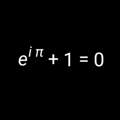Wie stelle ich hier nach y um?
Ln(x+2) + C = Ln(y+2)
C ist einfach eine Konstante
2 Antworten
Vom Fragesteller als hilfreich ausgezeichnet

Von gutefrage auf Grund seines Wissens auf einem Fachgebiet ausgezeichneter Nutzer
rechnen, Funktion, Ableitung
ln(x + 2) + C = ln(y + 2)
e^(ln(x + 2) + C) = e^(ln(y + 2))
e^(ln(x + 2)) • e^C = y + 2
(x + 2) • e^C = y + 2
y = (x + 2) • e^C – 2
Woher ich das weiß:Hobby – Mathematik (u. Physik)

C = ln(y + 2) - ln(x + 2)
C = ln((y + 2) / (x + 2)) | e ^ (...)
e ^ C = (y + 2) / (x + 2)
(x + 2) * (e ^ C) = y + 2
y = (x + 2) * (e ^ C) - 2